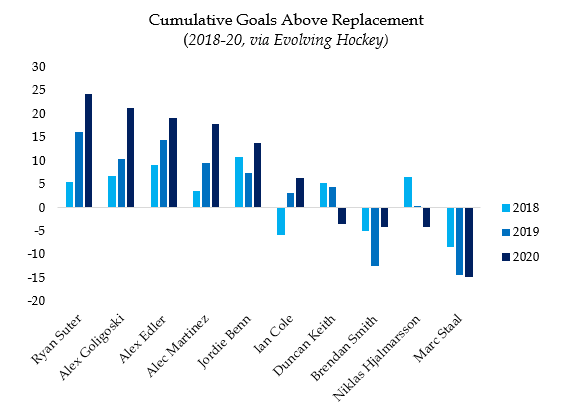Jul 15, 2021
Keith trade a reminder that timing is everything
Moving first in any market tends to carry higher risks and higher rewards, as the Edmonton Oilers found out this week in adding the veteran blueliner, Travis Yost writes.
By Travis Yost

On Tuesday, the Edmonton Oilers acquired veteran defenceman Duncan Keith from the Chicago Blackhawks. To land the 37-year-old blueliner and three-time Stanley Cup champion, the Oilers had to part ways with prospect Caleb Jones and a conditional third-round pick (2022).
The move was, in one word, curious. Keith may have one of the most impressive resumes of any active player, but there are serious performance concerns now late in his playing career.
General manager Ken Holland defended the move, citing Keith’s experience and leadership. It’s clear the Edmonton front office not only thinks Keith will bolster the team’s top four, but that he’ll be a positive impact on the Oilers’ star forwards next season.
Perhaps Keith will rebound – there’s no arguing he was playing on a rapidly deteriorating Blackhawks team that offered very little by way of support and structure, and his skating ability alone should fit in with an Oilers lineup that wants to play fast.
But a lot has changed in 48 hours. The Minnesota Wild, one day after the Keith trade, opted to buy out veteran defenceman Ryan Suter. The Florida Panthers followed suit on Thursday, buying out Keith Yandle.
Let’s circle back to a quote Holland gave after the Keith trade to The Athletic’s Daniel Nugent-Bowman, with specific attention to the price paid by the Oilers organization:
“What, do you want me to get him for free? You want a lesser price? You want Caleb Jones? You don’t want the draft pick? You want them to retain 50 per cent? Which would you like me to do? Do you want me to get them to retain money? Or do you think I paid too high a price with Caleb Jones and a third-round pick?”
It’s impossible for outsiders to know what the real trade market is yielding, and to that end, Holland is correct. But now those bearish on a Keith trade must consider a second question: Did being a first mover in this market cost the Oilers?
Moving first in any market tends to carry higher rewards and higher risks. One of the things you are considering when engineering a trade is alternatives and opportunity costs.
At the time of the trade, we can reasonably assume the Oilers preferred the combination of acquiring Keith and taking care of some of the expansion draft math they are working against in lieu of signing free-agent defenders looking for term – Alexander Edler and Dougie Hamilton at the top of that list.
But now you add players like Suter and Yandle to the free agency pool, which increases the available supply of talent for general managers to tap into.
Perhaps the Oilers don’t see a fit for players like Suter or Yandle. But consider the available supply of veteran defenders (age 30+, left shot, looking for shorter-term deals) in free agency relative to the player they acquired in Keith – and consider their respective production in recent years:

Holland is trying to build a Stanley Cup contender. Due to salary cap limitations (including a flat cap), the Oilers – like many teams – have reduced flexibility in terms of what they can do. On top of that, the organization is trying to figure out the right structure for which players to protect in the upcoming expansion draft.
On the other hand, there are a remarkable number of veteran defenders who are still contributing in a very positive manner, with Suter being at the top of that list. If the Oilers organization thought a veteran blueliner who can still play was the answer to what ails them, there were several options through free agency alone, and most of those options look much more encouraging than a player like Keith.
Even lower-tier players like Jordie Benn (age 33, coming off a $2-million dollar per-year contract) and Alec Martinez (age 33, coming off a $4-million dollar per-year contract) offer intriguing alternatives, and likely at a lower risk.
Signing one or more of these players may have caused another series of moves to become compliant for the expansion draft, but it also would have likely accomplished the most important thing – adding value to the lineup and improving the roster. And if nothing else, the added presence of players like Yandle and Suter readily available in free agency should have depressed the trade price of a player like Keith.
Hockey is a lot like everything else. Timing is everything. If Keith does not pan out as Edmonton anticipates, the cadence of how the Oilers’ off-season moves played out will be scrutinized in even finer detail.
Data via Natural Stat Trick, Evolving Hockey, NHL.com

